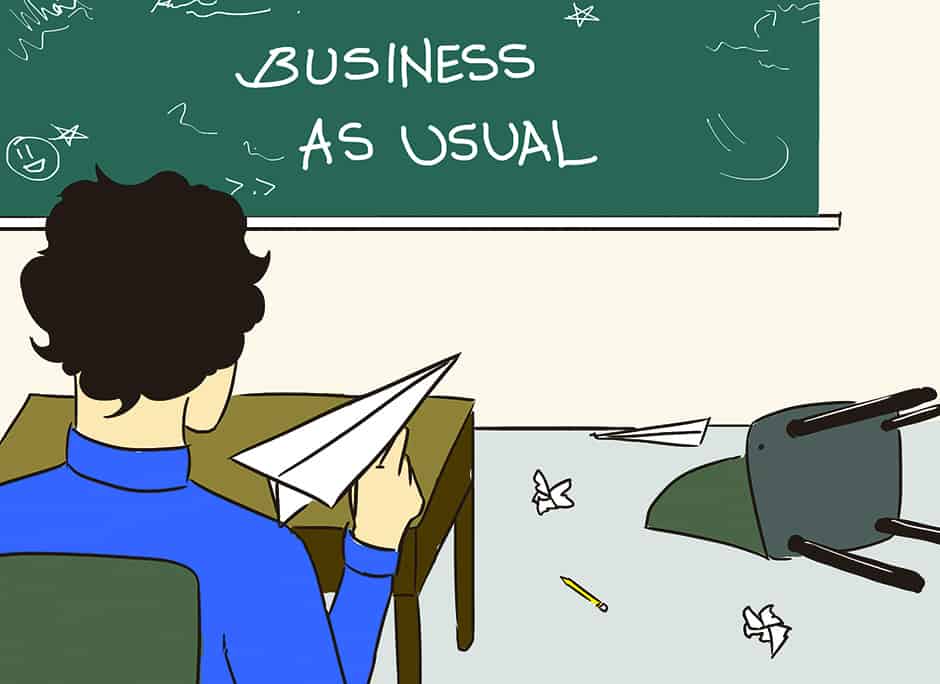With the news Thursday evening that administration and CUPE 3902 Unit 1 will be moving forward in negotiations through binding arbitration, the strike at the University of Toronto has finally come to a close after weeks of cancelled classes and tutorials and disruption throughout campus.
Over the course of the past four weeks of the strike, students and faculty at the university were left without administrative guidance, dealing with academic disruption on a disturbingly ad hoc basis. Excepting a regularly updated FAQ section of the university’s website, communication with students throughout the labour dispute was infrequent and vague. Some professors cancelled classes in solidarity with the TAs, while others dramatically altered syllabi to reduce marking and make completing the term manageable.
Certainly, this situation can hardly be described as “business as usual,” but the administration insisted upon shirking responsibility for its undergraduate students during the strike by acting under this false notion.
Just a few days before the strike ended, the Faculty of Arts & Science emailed students with some academic guidance. The options to cancel, or Credit/No Credit (CR/NCR) courses once their final grades are released without academic penalty for any courses this term were forwarded to students.
Instructors were also given the option to release grades either as percentages, letters, or CR/NCR on the basis of the amount of work that was assessed and syllabi adjustments. With exam invigilators on strike, the university’s academic continuity policy also included the possible cancellations of finals or changes in scope and format. A possible change could have been to reformat exams to multiple choice so that they could be marked more quickly with Scantrons.
This information arrived painfully late in the strike, and only after many students had endured significant stress brought about by uncertainty. More importantly, however, these options represent a lack of respect for actual classroom learning. Students do not take courses merely to receive credits and reach graduation. We value our degrees — not only do we often need information from our courses for application in other courses, graduate programs, and careers, but many of us also share a genuine desire to learn — a desire for which we are all willing to pay. In return, however, all we have received is cancelled classes and credits doled out without meaningful academic assessment.
Early last week, a first-year psychology class of over one thousand students was disrupted as a result of the strike. Rumours circulated on social media that the administration had locked the doors to Convocation Hall; some students alleged that picketers had taken a hard line in front of the iconic U of T lecture hall and were refusing to allow them to enter the building. The administration denied the former, while some members of CUPE 3902 denied the latter.
Meanwhile, the course took place in the centre of King’s College Circle as an informal conversation rather than a lecture. The professor made the decision to hold the discussion outside. He later told The Varsity that this was not meant as a political decision, but rather a judgement call balancing different concerns.
Whether or not this represents a sound decision, the fact that the professor had to make such a significant choice in such an ad hoc manner is demonstrative of the lack of communication between the university and its staff. Students who commuted downtown for the lecture may not have done so had they known that the material covered would not be used for academic assessment, as the professor later announced; students with accessibility concerns may not have been able to attend an outdoor class.
This example is but one representative anecdote of many: lectures being cancelled indefinitely, essays being dramatically cut down in length, syllabi being adjusted without class votes, high grades being offered to full classes, and more.
The Arts and Science Students’ Union says it received approximately 130 academic complaints from undergraduate students per week during the strike, totalling around 500 for the month. This strike, for undergraduate students, has been characterized by misinformation, rumours, and stress.
Moreover, the strike has underscored the administration’s indifference towards our education. Not only were undergraduate students not provided with meaningful academic leadership throughout the past month of disputes, but the university’s eventual response — on the cusp of the exam period, no less — represents nothing short of a clear disrespect to the value of our education.
Much of the discourse surrounding this strike has centred on its underlying ideological motives. Members of CUPE 3902 were standing up against what is increasingly perceived as the corporate strategy of the university. U of T’s callousness towards undergraduates throughout the strike and ultimate solution of desperately fast-tracking credits in order to spare the term represents a failure of administrative leadership; it also paints a vivid picture of the commercialized academic institution that the university is becoming. U of T should not be a factory that churns out degrees. Our time here is valuable, but so as long it remains undervalued by the institution’s top players, it seems that our education will be secondary to our graduation.
Correction (April 6, 2015, 12:52 pm): A previous version of this article referred to the course that took place outside Convocation Hall as a sociology class; in fact, it was as psychology class. The Varsity regrets the error.


